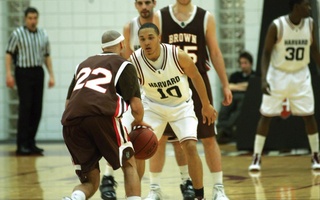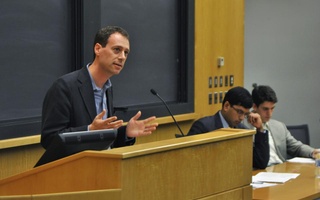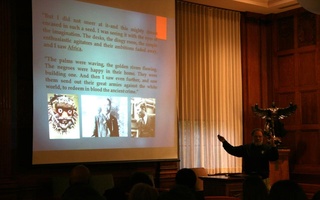If there is any regional conference at Harvard that has achieved its goal of on-campus exposure, it is Harvard Arab Weekend, a three-and-a-half-day long conference of keynote addresses, panels, and networking sessions that concluded just this past Sunday. As the seventh iteration of North America’s largest pan-Arab conference, Harvard Arab Weekend, organized by the Harvard Arab Alumni Association and a large team of student volunteers, has set the bar for regional and national conferences at Harvard, which tend to operate more as boutique events than must-attend annual gatherings.
We admire the broad scope of Harvard Arab Weekend, which included keynote addresses from such leaders as Queen Rania of Jordan and such academic luminaries as Roger Owen, as well as a start-up competition, and panel discussions about education, water scarcity, Syrian refugees, and the Israeli-Palestinian conflict. It also provided opportunities for students to mingle with opinion leaders and potential employers. The conference’s 2013 motto, “Cherish—Challenge—Change,” represented a healthy spirit of reverence for the Arab world’s cultural legacy, desire to power through its obstacles, and objection to the narrow paradigms through which the Middle East is seen internationally at this tumultuous point in history.
The Arab experience is not, Harvard Arab Weekend reminds us, all sectarian conflict and political deadlock. It is filled with entrepreneurial promise and human developmental challenges as well, and Western audiences ought to be reminded of this from time to time.
We are concerned that Harvard Arab Week has strong ties to a well-heeled Gulf political elite. Among the platinum sponsors of the conference is Saudi Aramco, the state oil and gas company of the Kingdom of Saudi Arabia—valued at $10 trillion and a critical asset of the Saudi state. One of the conference’s two media sponsors is Al-Arabiya, a regional news network owned by members of the Saudi royal family and organized in direct competition with Qatar’s Al-Jazeera. Keynote speakers, who spoke pleasant words about reform, hailed from the royal families of Morocco, Jordan, and Saudi Arabia, authoritarian cliques, which have preached reform in the Levant and Egypt, but prefer tightlycontrolled stability at home.
Harvard Arab Weekend’s ties to conservative, oil-producing regimes under the tutelage of a stability-concerned American hegemon raise questions about its efficacy as a platform for new understandings of the Middle East. “Change” is a fine slogan, but it is meant by the Saudi regime—a supporter of Harvard Arab Weekend, Harvard University, and the United States government—in the sense of “for thee, not for me.”
However, it is to the credit of Harvard Arab Weekend’s big profile and engaging topics that we are having this conversation at all. Would-be reformers from Africa, South Asia, and East Asia would do well to follow suit, minus the autocratic sponsors.
Read more in Opinion
The Rulebooks in Our HeadsRecommended Articles
-
 The Conundrum of NCAA Tournament Expansion
The Conundrum of NCAA Tournament Expansion -
 Harvard Graduate Conference Unites Global Thinkers on Political Theory
Harvard Graduate Conference Unites Global Thinkers on Political Theory -
Conference Brings Graduate Students TogetherThe Harvard Graduate Council hosted the Harvard Leadership Conference this past Saturday to give graduate students from different disciplines the opportunity to come together and discuss the challenges facing leaders today.
-
Portrait of an ArtistJill Sigman, a choreographer of modern dance, discusses movement, performance, and the body.
-
Ivy League and Big 10 Launch To Jointly Research Head Injuries in AthleticsIn the wake of an increased awareness of the dangers of head trauma in sports, the Ivy League and Big Ten Conferences will partner in research on concussions and other head injuries in collegiate athletics.
-
 Graduate Students Discuss Caribbean Diaspora at Conference
Graduate Students Discuss Caribbean Diaspora at Conference













